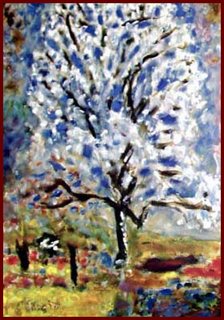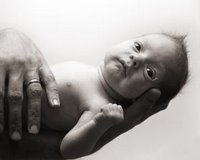All the way to the hospital
The lights were green as peppermints.
Trees of black iron broke into leaf
ahead of me, as if
I were the lucky prince
in an enchanted wood
summoning summer with my whistle,
banishing winter with a nod.
Swung by the road from bend to bend,
I was aware that blood was running
down through the delta of my wrist
and under arches
of bright bone. Centuries,
continents it had crossed;
from an undisclosed beginning
spiralling to an unmapped end.
II
Crossing (at sixty) Magdalen Bridge
Let it be a son, a son, said
the man in the driving mirror,
Let it be a son. The tower
held up its hand: the college
bells shook their blessings on his head.
III
I parked in an almond's
shadow blossom, for the tree
was waving, waving at me
upstairs with a child's hands.
IV
Up
the spinal stair
and at the top
along
a bone-white corridor
the blood tide swung
me swung me to a room
whose walls shuddered
with the shuddering womb.
Under the sheet
wave after wave, wave
after wave beat
on the bone coast,
bringing ashore - whom?
New-
minted, my bright farthing!
Coined by our love, stamped
With our images, how you
Enrich us! Both
you make one. Welcome
to your white sheet,
my best poem.
V
At seven-thirty
the visitors' bell
scissored the calm
of the corridors.
The doctor walked with
to the slicing doors.
His hand is upon my arm,
his voice - I have to tell
you - set another bell
beating in my head:
your son is a mongol
the doctor said.
VI
How easily the word went in -
clean as a bullet
leaving no mark on the skin,
stopping the heart within it.
This was my first death.
The 'I ' ascending on a slow
Last thermal breath
studied the man below
as a pilot treading air might
the buckled shell of his plane -
boot, glove and helmet
feeling no pain
from the snapped wires' radiant ends.
Looking down from a thousand feet
I held four walls in the lens
of an eye; wall, window, the street
a torrent of windscreens, my own
car under its almond tree,
and the almond waving me down.
I wrestled against gravity,
but light was melting and the gulf
cracked open. Unfamiliar
the body of my late self
I carried to the car.
VII
The hospital - its heavy freight
lashed down ship-shape ward over ward -
steamed into night with some on board
soon to be lost if the desperate
charts were known. Others would come
altered to land or find the land
altered. At their voyage's end
some would be added to, some
diminished. In a numbered cot
my son sailed from me; never to come
ashore into my kingdom
speaking my language. Better not
look that way. The almond tree
was beautiful in labour. Blood-
dark, quickening, bud after bud
split, flower after flower shook free.
On the darkening wind a pale
face floated. Out of reach. Only when
the buds, all the buds were broken
would the tree be in full sail.
In labour the tree was becoming
itself. I, too, rooted in earth
and ringed by darkness, from the death
of myself saw myself blossoming,
wrenched from the caul of my thirty
years' growing, fathered by my son,
unkindly in a kind season
by love shattered and set free.
Jon Stallworthy
___________________________________________________

A longer poem this time, and one that means a great deal to me. I was so moved by it that I learned it by heart and have carried it around in my head for over 30 years. I love it both for its emotional weight, and for the richness of its imagery.
It tells a story and one that any reader can relate to: a father rushes to the hospital for the birth of his son, and is told that the son has Down's Syndrome.
Stallworthy calls it the most straightforwardly autobiographical of his poems.
Look at how the emotions shift from stanza to stanza. As the father drives to the hospital, there's a real sense of elation as he contemplates his son's birth and the passing on of new life down the generations. (I love the image of the blood running under arches of bone - a river of life, flowing from father to son across the ages.)
By the end of stanza 4 I'm all choked up when I reach this expression of love:
"Welcome/to your white sheet,/my best poem." What more fitting tribute from a poet! (Stallworthy later said that the words were an unconcious echo of Ben Jonson's elegy,
On My First Son):
But then there are the doctor's words to shatter his joy.
"How easily the word went in -/clean as a bullet/leaving no mark on the skin,/stopping the heart within it." These words bring home the emotional impact of the news.
Isn't it just so true that at the moments of greatest trauma we feel distanced from our physical body, as if we are observing ourselves from a distance? Stallworthy compares himself to a pilot treading air after being ejected mid-air, and watching the wreck of everything from above. Part of him dies at that moment:
"This was my first death".
In a sense too, there's a bereavement that he has to handle. The son of his hope and imagination is drifting away from him, to be replaced with someone who will never speak his language (in a metaphorical sense). But from that pain grows transformation and new awareness. And he realises that he'll learn a different lesson of love from his handicapped child.
Just as physical objects become invested with greater meaning at moments of emotional crisis. (We seem to notice things in much greater detail.) The blossoming almond tree outside the hospital seems complicit in everything.
I seldom reach the end of the poem with dry eyes. Stallworthy is as powerful a story-teller as any fiction writer.
Labels: bibliobibuli's choices, poems about disability, poems about fatherhood, poems about parenthood
 Malika Booker was in Malaysia last year both to perform and to run workshops, and I had the pleasure of interviewing her for StarMag, which is where this poem appeared.
Malika Booker was in Malaysia last year both to perform and to run workshops, and I had the pleasure of interviewing her for StarMag, which is where this poem appeared.
